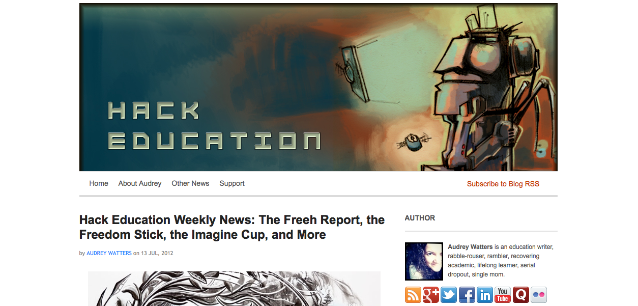Lesson plans, social bookmarking and the purpose of education: a response to the latest Hack Education podcast

I was fortunate enough to meet the amazing Audrey Watters and Steve Hargadon when I was over in San Francisco earlier this year. The authenticity of the ‘Irish’ pub in which we met was questionable, but their commitment to furthering education certainly isn’t!
Steve and Audrey have a weekly podcast in which they reflect on Audrey’s (prolific) written output over the past seven days. Today I listened to the one embedded at the bottom of this post (also here). They’re both so insightful that I wanted to be part of the conversation. The only way I can do so at the moment is by adding my thoughts here.
So that’s what I’m going to do.
Lesson plans
Steve brought up the point that companies build business models around the idea that teachers want to share lesson plans. He questioned whether that’s actually true.
Not in my opinion.
In my experience, the needs of classroom teachers (which used to include me) are on a spectrum related to interest. So, for example, I’d spend hours researching and creating resources around 1066 and the Norman Conquest. I love that period of History.
On the other hand, I tried to get the Agricultural Revolution out of the way as soon as possible, and used resources in my lessons almost entirely created by other people.
And that’s the difference: if you’re a motivated teacher, you don’t want prescriptive lesson plans for stuff that excites you. Of course, if you’re an ineffective, demotivated teacher, you’ll grab as many lesson plans as you can.
Lesson plans are different to learning resources. I used to have a huge collection of both physical and digital resources, neatly categorised, upon which I could draw. Very motivated and effective teachers within the UK History teaching community would share these – but do different things with them.
Sharing lesson plans as a business model misses the point, I think. Learning, as both Audrey and Steve pointed out, is about relationships not content-delivery.
Social bookmarking
One of the tangential conversations Steve and Audrey had was around social bookmarking. Steve ‘confessed’ to not really using social bookmarking services such as delicious or diigo any more.
I’m glad it’s not just me.
Since delicious has changed hands from Yahoo! to some randoms, I haven’t even got the bookmarklet or Firefox extension installed. I re-find things either through a search engine, my Thought Shrapnel tumblr or Evernote. As Steve mentioned, the personal (primary) benefit is more important than the (secondary) social benefit in this regard.
What I did find interesting is that Audrey uses Pinboard which positions itself as ‘social bookmarking for introverts’. I’ve got a (paid) account there, so I may give that another try.
The purpose of education
Time and time again, Audrey came back to the purpose of education. It’s not about content delivery. It’s not about power. It’s not about money.
This is something that’s obviously close to my heart.
I really enjoyed listening in to Steve and Audrey’s conversation and shall do so regularly. I just hope that as the podcast develops they summarise the stories before analysing them. What’s huge in the US (for example) is sometimes barely reported over here in the UK. I had to read between the lines of the Penn State controversy, for example.
But that’s a minor, nitpicking point. Listen to the podcast. It’s awesome.
